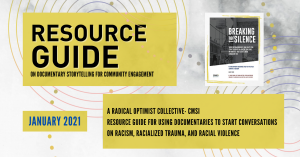We live in an era of the post-screening expert panel. A time when well-intentioned community organizers have grown accustomed to using panels of “experts” to discuss the hot-button issues of our time. It must sound familiar: a documentary is screened about an important issue and then a group of experts come and explain what it all really means. Sometimes there is a little Q and A, and then everyone is dismissed.
But a real conversation, one that might lead to tangible change in the perspectives and behaviors of a community, can hardly be expected if everyone defers to “the experts” in the room for answers. It requires engaging with one another and confronting uncomfortable truths together.
This is one call to action found in the new publication Radical Optimist-CMSI: A Resource Guide for Using Documentaries to Start Conversations on Racism, Racialized Trauma, and Racial Violence, which provides documentary filmmakers, impact producers, public broadcasters, and civic and community groups with a set of insights and resources that they can use to facilitate engagement, dialogue, and community building around urgent social justice issues, including racism, racial violence and racial justice in America.
Prepared by Radical Optimist Collective and CMSI, this guide was created based on lessons learned during a participatory research study — Breaking the Silence: How Documentaries Can Shape The Conversation on Racial Violence in America and Create New Communities— held in seven communities across the country in February of 2020, which used a community screening of the documentary Always in Season to catalyze community conversations and break long-standing cultures of silence around issues of racial violence.
This guide also reflects an attempt to learn from community organizations and people who are facilitating conversations around racial violence and healing, though they may not be working specifically with the medium of documentaries. The Radical Optimist Collective is one such example, a women-led organization that leads visits and conversations around the Legacy Museum and The National Memorial for Peace and Justice in Montgomery, Alabama. As the lead writers and designers of this guidance, Radical Optimist offers some of their tools and experiences that are directly relevant to organizers of documentary screening events.
Among the findings of the Breaking the Silence study, funded by ITVS through the support of the Ford Foundation, the participatory research highlighted the need for more community-centered guidance and resources on how documentaries can be used as tools in facilitating productive, equitable, and safe-enough conversations on issues of racism and racial violence — among other important social justice issues — in communities across the country.
This new resource guide reflects one step toward providing such urgently needed guidance, and one contribution toward an improved era of documentary engagement.

